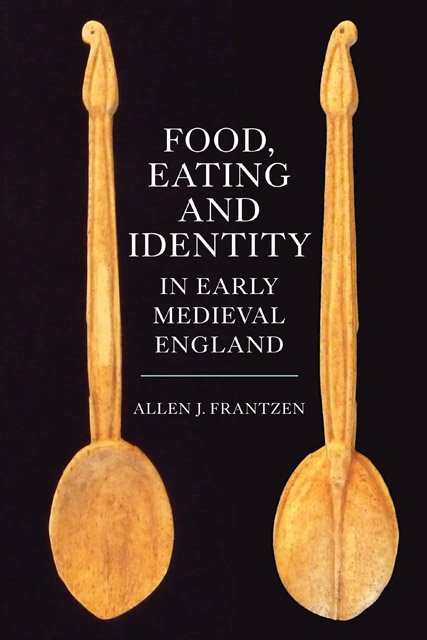3 - Food Words and Old English Genres
Published online by Cambridge University Press: 14 February 2023
Summary
Texts are much easier to study than are things, since texts are more readily available and finite. Objects from the Anglo-Saxon world will continue to be discovered so long as humans dig into the soil, whether the objects are removed from it or, as may soon become possible, thoroughly examined without being extracted. It is very rare indeed that new words are discovered, although the meanings of some words long known will long be debated. How close texts can bring us to the material world of eating in early medieval England depends on the food vocabulary and its disposition within the surviving genres of Old English.
Food networks in the Thesaurus of Old English
I begin my exploration in the abstract, examining food words as they stand in a modern source, the Thesaurus of Old English (TOE). Both a “treasury” and a “storehouse of knowledge” (which is how the OED defines “thesaurus”), the TOE aims to include every word in the lexicon. Its entries are organized into “strings of words” that share “a component of meaning.” These strings are “embedded within an inclusive conceptual scheme” of eighteen categories of meaning that were derived from English dictionaries. I treat these categories as nodes, each radiating outward to conceptual subdivisions that are themselves divided into dozens of words. I propose to use the TOE as a lexical form of the food network.
The TOE creates a fresh view of Old English. Unlike its cousin, the Dictionary of Old English (DOE), the TOE is not alphabetically organized, although the editors have wisely provided an alphabetical index. They describe the TOE as an “inside-out dictionary” but acknowledge that it resembles a real dictionary because it “incorporates information about word meaning” that native speakers would not need but that readers today cannot do without – although some words in the TOE would also have left many native speakers scratching their heads. Because words in the TOE have no context but other words with similar or related meanings, the thesaurus, like a dictionary, can be said to atomize the genres of Old English. In the TOE it does not matter in what kind of text a word occurs. What matters is the word’s meaning in the context of the “strings of words” to which the word belongs.
- Type
- Chapter
- Information
- Food, Eating and Identity in Early Medieval England , pp. 59 - 60Publisher: Boydell & BrewerPrint publication year: 2014

